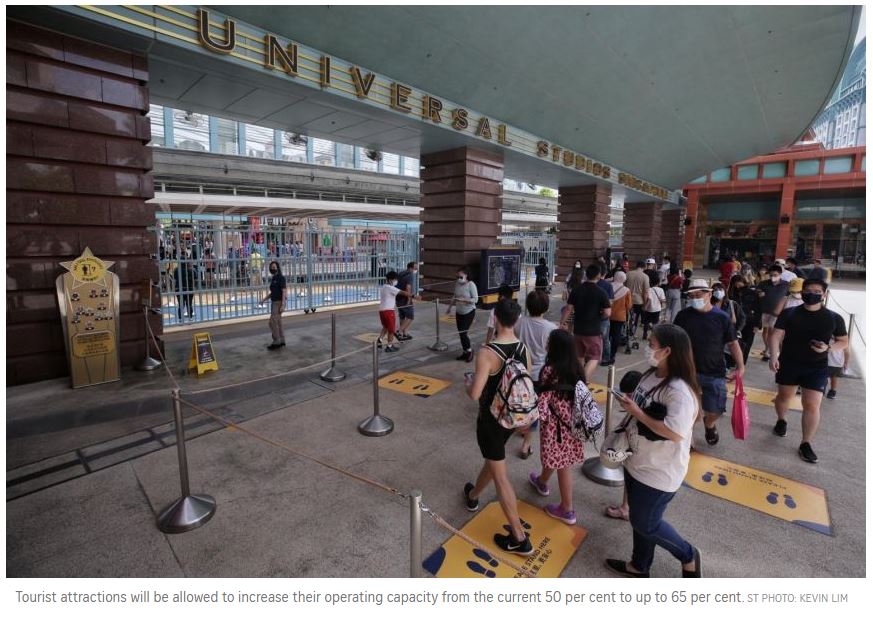Businesses cheer relaxed rules in Singapore’s phase 3 but border reopening still key
SINGAPORE – The move to relax restrictions and enter phase three of the economy’s reopening on Dec 28 has been welcomed by businesses, with those in retail, restaurants and the tourism sector hopeful of a boost to sales or footfall by 10 to 20 per cent.
But a real game changer for the economy could be when enough people take up the Covid-19 vaccine, so more restrictions can be relaxed, including border controls, businesses and analysts told The Straits Times on Tuesday (Dec 15).
Dr Kevin Cheong, chairman of the Association of Singapore Attractions, said the move to allow approved tourist attractions to increase their operating capacity from the current 50 per cent to up to 65 per cent is significant.
“This will allow attractions to be able to accommodate more visitors during weekends and public holidays – we can make hay while the sun shines,” he said, adding that footfall to tourist attractions is expected to grow by 15 to 20 per cent across the board with this change.
Allowing people to gather in groups of eight, up from five, is also a welcome move, said Mr Andrew Tjioe, president and chief executive of TungLok Group. “Majority of TungLok’s restaurants are Chinese restaurants and diners usually come in bigger family groups… It is also timely as we prepare for Chinese New Year reunions over the next two months,” he said.
The retail sector will also benefit from larger group sizes, though retailers would have liked to see the changes kick in before the festive season, to take advantage of the holiday sales boost, said Singapore Retailers Association executive director Rose Tong. “But we appreciate that the decision was made with safety in mind,” she added.
However, it will be some time before things return to normal, said Singapore Business Federation chief executive officer Ho Meng Kit.
Much hinges on the roll-out and take-up rate of a vaccine, which will eventually pave the way for borders to be reopened once confidence in governments’ ability to manage the virus returns, he said.
Dr Cheong and Ms Tong agreed, saying the return of tourism will help bring footfall and sales figures back to pre-Covid levels.
Maybank Kim Eng analyst Chua Hak Bin said sectors such as manufacturing and construction are also affected by labour shortage and supply crunch issues as borders are still largely closed, and this continues to affect growth.
Ms Cinn Tan, chief sales and marketing officer of Pan Pacific Hotels Group, said as demand increases with the relaxation of rules, having enough trained manpower will be a challenge. More staff and resources will be needed so that restaurants can serve food safely, and for thorough cleaning and disinfecting to be carried out, she added.
A further easing of restrictions on returning to the workplace would be beneficial for SaladStop, which serves a large base of customers in the central business district, said its managing director, Mr Adrien Desbaillets.
Mr Vincent Tan, managing director of food service provider Select Group, hopes food catering services would be able to gradually resume, with pilots being carried out to determine what safe management measures would be needed.
While the capacity limit for malls and large standalone stores will be increased from 10 sq m per person to 8 sq m, Ms Tong noted that many retailers are still constrained by the layout of their shop spaces.
“Changing the layout is easier said than done as there are additional costs involved,” she said.
Relaxing rules on road shows and promotional shows could make a difference to retailers, she added.
While he noted that the changes announced have been incremental, they still make a difference, said Association of Small and Medium Enterprises vice-president Ang Yuit.
“It means that we are moving forward, and Singapore, as a nation, has been successful in containing and managing the virus,” he said.
“It gives us room and reason to be optimistic about the future.”
Source: https://www.straitstimes.com/singapore/relaxed-rules-in-phase-three-will-boost-growth-though-border-reopening-remains-key


 Thailand
Thailand




